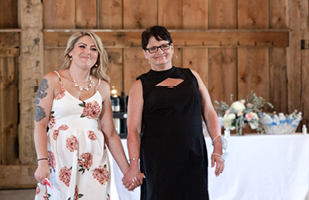Human Trafficking Victims Persevere through Pandemic, Celebrate Survival

Chelsea Millay (left) and Lori Moyer (right) overcame unprecedented hurdles caused by COVID-19 to graduate from Franklin County Municipal Court’s CATCH Court.

Chelsea Millay (left) and Lori Moyer (right) overcame unprecedented hurdles caused by COVID-19 to graduate from Franklin County Municipal Court’s CATCH Court.
The struggles of 2020 are a challenge to all.
But if anyone were equipped to overcome such obstacles, it’s two women who’ve endured years of unimaginable strife to graduate this fall from an innovative specialized court docket.
The unprecedented hardships brought about by the coronavirus pandemic weren’t enough to stop Chelsea Millay and Lori Moyer from completing Changing Actions that Change Habits (CATCH) Court, a Franklin County Municipal Court treatment program that was the first in Ohio to assist survivors of human trafficking.
“CATCH Court, you are my family. You saved my life,” said Moyer. “I would not be standing here today if you wouldn’t have let me in CATCH.”
Millay and Moyer were among 14 participants eligible to complete all of the court requirements prior to the COVID-19 outbreak. However, the inability to convene in person for months due to public health guidelines and the difficulties to fulfill court mandates while in isolation prevented many of their peers from staying the course to become part of the program’s 10th annual graduating class.
“COVID-19 sidetracked others, but the two of you remained strong and completed the hard work in order to graduate. Today, we celebrate you,” said Judge Paul Herbert, the program’s founder who recently relinquished the specialized docket after 11 years of service.
The inventive docket was created in 2009 to help women recover from substance use issues and exploitation trauma through counseling and drug and alcohol treatment. Since its inception, 69 women have graduated from CATCH Court. Of those who graduated, 85% of them have had no additional charges.
“It’s not just shuffling people through a process. It’s about getting to know what people need so they can get past this step in their life, and on to who they were created to be,” said Columbus City Councilwoman Shayla Favor, the keynote speaker at the socially distanced event in Upper Arlington. The ceremony also live streamed for those who couldn’t attend.
CATCH Court has served as a template to other courts across Ohio that have created human trafficking-themed specialized dockets. Three are certified by the Ohio Supreme Court: Cleveland Municipal Court, Hamilton County Municipal Court, and Summit County Juvenile Court. The other three are in the certifications process: Franklin County Juvenile Court, Akron Municipal Court, and Youngstown Municipal Court.
A primary motivation for entrants into this type of rehabilitative process is mending severed ties with families. Whether those fractured relationships are from personal interactions or court sanctions, the incentive of reunification with lost children and loved ones provides much-needed encouragement during tough times as part of a life-altering transition.
“I’m incredibly grateful for everything everyone has done for me. I’ve got my family back,” Millay said.
Stigmas associated with human trafficking make it difficult to discuss their journeys openly as a way to increase awareness about its pervasiveness in Ohio. So, those enrolled in CATCH Court rely on a tight-knit community with shared experiences.
Many peers who support each other throughout the process become mentors and develop a pipeline of comfort and resources. The premise is predicated upon constant growth – both individually and collectively – as phases of the program, including graduation, are points down a lifelong path.
Gina Burrows, this year’s graduate speaker who was part of the 2016 class, stressed the importance of people and patience throughout the endeavor.
“Lean into the mentors’ support and encouragement,” she said. “Don’t beat yourself up if you get off track. You are amazing, and you are a miracle.”


